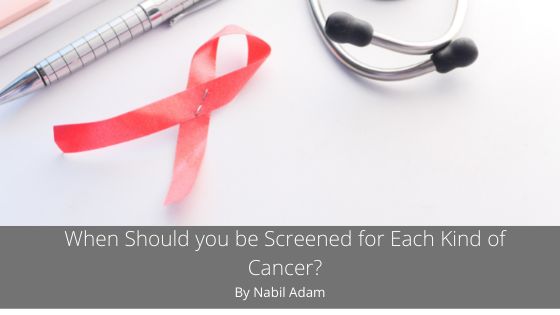Cancer screenings should be a regular part of everyone’s health routine. If people don’t go to the doctor regularly, however, they may be unsure of the right time to get screened for different types of cancers. This guide will advise you about the right times to begin and stop screening for different varieties of cancer.
Colon Cancer
If you have an elevated risk of contracting colon cancer due to genetic disorders or familial history you should discuss screenings options with your primary care physician in your 20s. For everyone else, colon cancer screening should start at 45. Discuss different testing options with your doctor. You should continue to have screenings until you reach 75, at which point you can discuss options with your physician again. After the age of 85, most people no longer need screenings for colon cancer.
Breast Cancer
Regular at-home tests for breast abnormalities should be conducted by anyone at risk for breast cancer, paying particular attention to any changes in how the breasts look. Unless you have a family history of breast cancer or are at increased risk due to other factors you shouldn’t need to start yearly mammograms until age 45, although it’s possible to start as early as age 40 if you and your doctor agree it is necessary. After age 55, you can start getting every 2 years.
Cervical Cancer
Anyone with a cervix should start cervical cancer testing at age 25, taking a primary HPV test every 5 years, or exploring other testing options with your primary care physician. These tests should continue until you’re 65, at which point testing should no longer be needed as long as you have had 10 years of normal results.
Prostate Cancer
People with a familial history of early prostate cancer should talk to their doctor about getting prostate cancers screenings as early as age 40. Anyone at risk should talk to their doctor at age 50 to determine whether testing is necessary.
Lung Cancer
Anyone with a history of smoking should discuss lung cancer screenings with their doctor around age 50. Depending on how recently you quit smoking, how frequently you smoked, and for how long, screening may be beneficial.
Having regular screenings for different kinds of cancers at the appropriate age is a vital preventative step in catching cancer early making sure you stay in good health for as long as possible. Although it’s sometimes a hassle to keep up with, make sure to schedule the recommended checks to keep yourself healthy.

